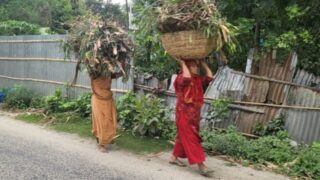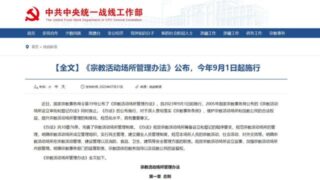CCP intensifies the already sweeping surveillance of places of worship by assigning officials to each; to control believers and ensure loyalty to the Party line.
Zhang Wenshu
According to a document, issued in March by the government of a locality in the eastern province of Shandong, entitled “Team of Three People Stationed at Venue” Working Plan for Religious Activity Venues (Activity Locations), teams of three officials are assigned to each religious venue to ensure that they properly implement CCP policies. Their specific duties include: to determine the number of believers in each congregation, to report on any “illegal religious activities,” and to eliminate “hidden dangers in the nascent stages.” Among illegal activities are the use of unauthorized versions of the Bible, the holding of private religious gatherings, contacts with foreign churches, visits by out-of-town preachers, and minors or Party members entering churches.


The teams are also required to supervise the financial activities of religious venues, “educate and guide” the clergy and members of the congregation on the CCP policies and regulations, visiting each site twice a month. They must also familiarize themselves with the layout of venues, find out home addresses and economic standing of the clergy, and report this information to the United Front Work Department.


The teams are required to fill out a form after each visit to religious venues, including the following information:
- Communication with believers, specifying the name, gender, age, and duties in the place of worship;
- Changes of personnel at the venue: the names of added or removed people and reasons for the changes;
- Incidences of any illegal religious activities;
- Enumeration of regular religious activities;
- Do members of congregations study the speeches by secretary general Xi Jinping, religious policies, regulations, and the so-called four requirements? Are they “up-to-standard” citizens and “sinicized” believers?


The teams of three are usually headed by an official from the United Front Work Department or the Religious Affairs Bureau, and the other two members are leaders of grassroots communities or villages. Government-licensed Christian, Buddhist, Islamic, and even folk-belief religious venues are all included in the scope of the supervision.


The system has been used since 2016 in some regions of China, but was started to be used more widely in 2018. According to the official website of the government of Huangyan district of Taizhou city in the eastern province of Zhejiang, similar provisions were adopted on March 28 in Shangzheng township.


With surveillance cameras in plain view, and information officers and undercover agents infiltrated in religious venues, the system of “teams of three” is yet one more tool of suppression in the already all-encompassing control mechanism of the religious in China.









